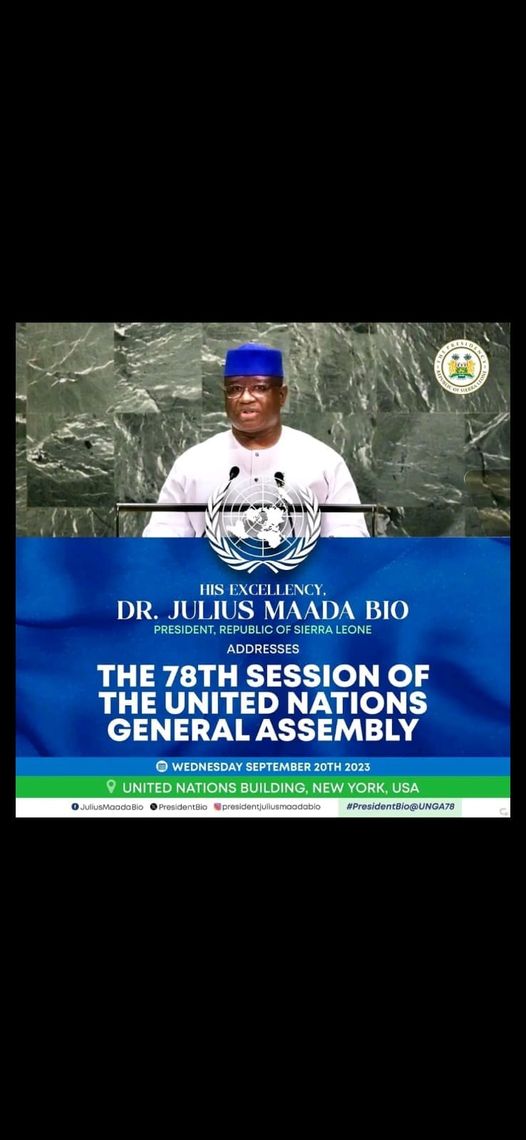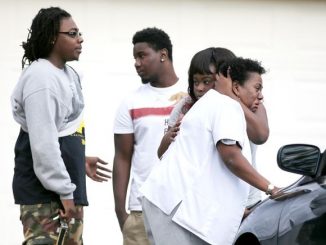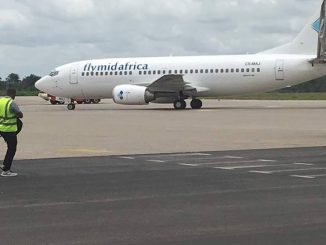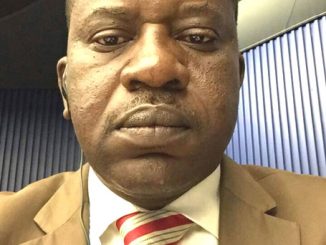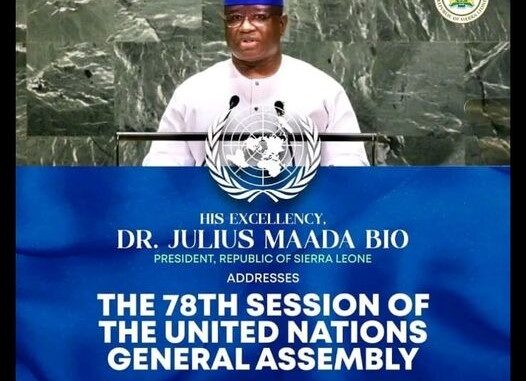
President Maada Bio yesterday addressed the 78th Session of the UN General Assembly. Here is his statement.
President of the General Assembly; Secretary-General of the United Nations; Colleague Heads of State and Government; Distinguished Ladies and Gentlemen; The soul of Sierra Leone, echoing the spirit of Pan-Africanism, resonates with the clarion call of this year’s theme to “REBUILD TRUST AND REIGNITE GLOBAL SOLIDARITY.”
A testament to our enduring democratic spirit was showcased on 24th June when, in free, fair, and peaceful multi-tier elections, the Sierra Leonean people elected their leaders across various tiers of governance.
My re-election as President for a second and final term serves not merely as an endorsement of my leadership but a solemn testament to my Government’s commitment to fashioning a Sierra Leone that thrives as a united, peaceful, and dynamic bastion of hope and opportunity.
A nation where our aspirations for abundant jobs, food security, quality education, and equitable healthcare are not mere dreams but manifest realities. Where justice and opportunity are not the prerogatives of a few but the birthright of all.
FIRST FIVE-YEAR TERM REVIEW
Mr President, in the face of global upheavals ─ from the pandemic to geopolitical tensions exemplified by the war in Ukraine and the ensuing food crisis ─ my first term stood as a beacon of our unwavering commitment to democratic freedoms and human rights.
We rooted out the unpleasant legacies of the past, repealing antiquated laws such as the seditious libel statute that lingered for half a century. We consigned the death penalty to the annals of history and charted bold advances against the scourge of corruption.
Our devotion to education was unambiguous: over 800,000 new learners were introduced under our aegis, and we significantly augmented domestic educational funding, ensuring it constituted an average of 22% of our national budget. We championed an ethos of radical inclusion, providing unfettered and tuition-free access to quality primary and secondary school education for all — be it expectant girls, adult learners, children from our most vulnerable communities, or those with disabilities.
In our unwavering commitment to dismantle the barriers of gender inequality, my administration declared a state of emergency on the heinous crimes of rape and sexual and gender-based violence. We have championed justice, especially for the marginalised and underprivileged, by broadening the spectrum of legal aid and instituting a specialised court to expedite the adjudication of sexual offences.
Sierra Leone urged global solidarity on access to justice and remedies for survivors of sexual violence and the recognition of November 18 by the General Assembly as World Day for the Prevention of and Healing from Child Sexual Exploitation, Abuse and Violence. I renew our call to the global community for a unified stance on ensuring justice and healing for survivors of sexual violence.
Our Gender Equality and Women’s Empowerment Act of 2022 shows our commitment to equality. With this Act, I have proudly inscribed our nation’s pledge to reserve a minimum of 30% of seats in elected and appointed offices for women. Beyond mere numbers, this Act speaks to the very soul of our nation ─ ensuring equal employment opportunities, lengthening maternity leave, and compelling our financial institutions to chart pathways that amplify women’s access to the financial resources they rightfully deserve.
SECOND FIVE-YEAR TERM PRIORITIES
Mr President, as I step into my second term, my Government has carved out five pillars that will guide our national development trajectory: I. Food Security, intertwined with investment in agriculture, is poised not just to feed our nation but to fuel job creation, propel economic growth, and alleviate the weight of poverty. II. Human Capital Development, with a particular lens on gender equality. III. Youth Employment Scheme which promises our younger generation that their energy, passion, and ambition will find fertile ground in Sierra Leone. IV. Technology and Infrastructure Programme to pave sustainable pathways for economic growth. V. And the reform of our Public Service Architecture, refining its essence for utmost efficiency, professionalism, and service delivery.
At the heart of these endeavours, my Cabinet reflects our nation’s diverse, vibrant and youthful population. Ten of my Ministers are under the age of 40. There is a member of Cabinet from all 16 districts of Sierra Leone and a 34% female representation that not only meets but exceeds the requirement enshrined in our Gender Equality and Women’s Empowerment Act.
We aim to elevate Sierra Leone to a middle-income status by 2035. In this vision, we recognise the interconnectedness of our global fate. As daunting as it might seem, our mission cannot be realised in isolation. It is an urgent call for collective effort, mutual trust, and a rekindling of global solidarity.
THE SDGS TOWARDS PEACE, PROSPERITY, PROGRESS AND SUSTAINABILITY FOR ALL
Mr President, seventy-eight years ago, the United Nations was born from the profound understanding that peace, development, and human rights are inextricably intertwined. Each element nourishes the other, creating an equilibrium essential for global harmony.
As we stand at this juncture, let us remember the noble ambitions enshrined in the Charter of the United Nations: to foster international cooperation, to confront and surmount challenges, be they economic, social, cultural, or humanitarian in nature. It is in unity and shared purpose that the promise of a brighter, just, and peaceful world is realised.
The resonant theme of this General Debate, therefore, opens a horizon of possibilities, beckoning us to harmoniously forge ahead in the shared pursuit of “Accelerating Action on the Sustainable Development Goals”.
The 2030 Agenda for Sustainable Development isn’t merely an outline; it is a solemn pact we’ve entered, committing to crafting a world steeped in peace and prosperity. To realise this, member States of the United Nations must rekindle the fires of trust and galvanise a renaissance of global solidarity.
In pursuing the 2030 Agenda, we must resolve to LEAVE NO ONE BEHIND. We must fervently champion inclusivity, recognising the intrinsic value of every individual, irrespective of their circumstances.
ECOWAS REGIONAL PEACE AND SECURITY
Mr President, Sierra Leone raises its voice alongside our ECOWAS community, expressing unequivocal dissent towards any extra-constitutional changes of Government. Such challenges to the very bedrock of our democracy threaten the stability of individual nations and the fabric of our collective African identity.
While we stand united, it is not simply a call to maintain things as they are. Real stability and lasting peace don’t come from resisting threats or building defences. Instead, they arise from genuine, open conversations.
True dialogue requires honesty and a genuine willingness from all parties to adjust, adapt, and find mutual understanding. Everyone at the negotiating table must be ready to seek and find common ground.
While we emphasise the importance of dialogue, we can’t ignore a crucial reality: The ongoing threats to our Continent’s constitutional stability are signs of deeper problems. Every action that undermines the rule of law is connected to underlying issues. These range from past and present injustices to the burdens of poverty, widespread unemployment, and the dangers of discrimination.
In the wise words of the late Archbishop Desmond Tutu: “There comes a point where we need to stop just pulling people out of the river. We must go upstream and find out why they’re falling in.” We must all ask ourselves: Are we doing enough upstream? Are we addressing the root causes rather than merely managing the symptoms?
Our duty is clear: We must lift our people from poverty. We should focus on creating jobs and supporting industries that benefit our countries and our continent. As we have consistently emphasised in Sierra Leone, these endeavours are built on education and human capital development pillars.
Any attempts to undermine the constitutional order will find no place to grow in a country with ample jobs, flourishing industries, and a prevailing sense of justice. Let us, therefore, not merely react to challenges but anticipate and mitigate them.
Together, we must envision an Africa where our Governments are not removed by unconstitutional means — not because they forcefully prevent them, but because the underlying causes for such challenges no longer exist.
NATIONAL ELECTORAL REFORMS
Mr President, elections, as vehicles of democratic transformation, fortify governance and allow for peaceful transitions. After our nation’s successful multi-tier elections on June 24, we stand resolved to strengthen our democratic foundations.
Recognising the significance of deepening our democracy, I have instituted a National Electoral Systems Review Committee to address historical challenges in our electoral process.
Since our first multi-tier General Elections were conducted after the civil war ended in 2002, the first General Elections in Sierra Leone for nearly two decades, the electioneering process has been plagued with persistent logistical challenges. To address these historical challenges and consolidate our democratic gains, a comprehensive review of the electoral systems is necessary to reform Sierra Leone’s electoral landscape.
The National Electoral Systems Review Committee will comprise the government, civil society, political parties, professional organisations and development partners. It holds the mantle of evaluating existing legal frameworks, institutional arrangements, and observer mission reports. Its mandate extends to proposing vital reforms fortifying Sierra Leone’s electoral integrity. These actions encapsulate our commitment to forging a fertile environment for dialogue, affirming democratic governance, and fostering enduring peace.
Mr President, it is regrettable to note the decision by certain member States to introduce unilateral coercive measures, including visa restrictions, on Sierra Leonean citizens following our recent multi-tier national elections. We observe that such unilateral measures, which are in contravention of international law, have sometimes been the response to electoral outcomes in other African nations to exert political pressure.
As members of the international rules-based community, African States strive for sovereignty and meaningful cooperation based on mutual respect and understanding. In democratic processes, every democracy faces unique challenges. However, the essence of sovereignty, as contained in the UN Charter, is the ability of Member States to address and resolve internal matters independently and without external pressure.
In our engagements on the international stage, we hope for understanding and mutual respect, especially on important issues like national elections. Constructive dialogue and open channels of communication should be the pillars of our global interactions and not punitive unilateral coercive measures that do not further the entrenchment of democracy but instead strain relations between nations.
Sierra Leone remains steadfast in its commitment to free, fair, and credible elections, alongside our dedication to the rule of law. We believe that democratic progress is a journey, and its pace varies from one nation to another. We respect the individual paths countries take in their quest for democracy and anticipate the same level of respect for ours.
We aspire to nurture relationships rooted in solidarity, cooperation, and mutual respect, all directed towards a shared global future.
UNITED NATIONS SECURITY COUNCIL TENURE
Mr President, as Sierra Leone takes its non-permanent seat at the UN Security Council for the 2024-2025 term, we are deeply aware of our shared duty to uphold international peace and security. The profound nexus between peace, development and human rights will be the beacon guiding our priorities.
We stand poised, resolute and committed to forging a world where these ideals are not mere aspirations but enduring realities for all. As Sierra Leone returns to the Security Council after a hiatus of 53 years, it does so with a profound awareness of its responsibility.
We view with deep concern the rising tides of insecurity and the subtle erosion of democratic governance and ideals in the West African subregion and the Sahel. Beyond our previously mentioned priorities, the fortification of peace, the bolstering of democracy, and the unwavering protection of human rights in the West African subregions and the Sahel are paramount on our agenda.
Our goal remains to thwart the seeds of conflict before they sprout, to ensure sustainable resources for African Union-led peace operations, and to silence the guns decisively and forever in Africa.
We seek not just the absence of conflict but the presence of enduring harmony and justice for all.
THE REFORM OF THE UN SECURITY COUNCIL
Mr President, Sierra Leone recognises the pressing issue of the Security Council’s legitimacy, equitable representation, and transparency. In a world reshaped by geopolitical realities, true global peace and security hinge upon the reform and rejuvenation of the UN Security Council and the General Assembly.
Joined by fellow UN Member States, Sierra Leone committed at the 2005 World Summit to “support early reform of the Security Council ─ an essential element of our overall effort to reform the United Nations ─ to make it more broadly representative, efficient and transparent and thus to enhance further its effectiveness and the legitimacy and implementation of its decisions”.
While the discourse has seen forward movement, the historical injustices endured by the African Continent remain unresolved at the intergovernmental negotiations. Africa glaringly stands alone as the only region without permanent representation within the Security Council and is conspicuously underrepresented in its non-permanent category.
The UN Security Council remains trapped in the era of 1945 when much of Africa was still in the regrettable grip of colonialism. We must not allow this colonial paradigm to persist three-quarters of a century later.
Africa’s demand for two Permanent seats ─ complete with commensurate rights, including the veto if maintained ─ and five non-permanent seats are issues of equity, justice and our right to have an equal say in decision-making on issues that affect the African region.
CLIMATE CHANGE
Mr President, our collective pursuit of sustainable development confronts the triple planetary crises of pollution, climate change, and biodiversity loss. Despite contributing minimally to these crises, Sierra Leone remains intensely vulnerable to their repercussions, a reality compounded by our limited capacity to cope.
Meaningful inclusion and inter-generational dialogue are crucial to achieving SDG 13. As the global community has recognised Climate Change as an existential threat to international peace and security, we welcome the Secretary-General’s convening of the Climate Action Summit and the multidimensional approach adopted to address Climate Change.
Our National Adaptation Plan, launched in 2018, stands as an embodiment of our commitment. Designed to halve our vulnerability by 2030, it underscores risk awareness, regulatory enhancements, institutional empowerment, and gender-responsive adaptation strategies.
Sierra Leone seeks equitable and timely access to climate financing. There must be unfettered access to leverage new climate change adaptation and mitigation technologies and shared knowledge.
Our salvation from the escalating climate change crisis lies in collective wisdom and concerted efforts. The Nairobi Declaration at the Africa Climate Summit in early September is pivotal in our collective efforts. It firmly renews our commitment to global climate action and sustainable development, infusing it with a distinctive African character. We call on the international community to prioritise humanity’s economic and ecological needs for sustainable growth and development.
Today, Sierra Leone has signed, and we eagerly anticipate the ratification and subsequent entry into force of the marine biodiversity Agreement to usher in a new era of marine environmental protection, fair and equitable use of ocean resources.
GLOBAL SOLIDARITY
Mr President, in today’s complex world, the urgent need to rebuild trust and strengthen global unity stands out. We must adopt a cooperative approach, set aside individualistic actions, and promote shared progress based on common values.
Solidarity results from hard work, tough decisions, and true empathy that challenges the status quo. It is not just a kind-hearted feeling. It is an active call to commitment, requiring determined and often selfless actions.
As we deal with disputes of sovereignty and self-determination across the world, we must also resolve to do so with dialogue, exhausting all avenues for peaceful resolution. Sierra Leone steadfastly supports all initiatives and commitments to peace, harmonious coexistence, and mutual recognition of both peoples’ rights, underpinned by nonviolence principles.
Our aspiration remains a world where everyone can live in unity and peace regardless of their background.
CONCLUSION
Mr President, in this evolving multipolar world, where conflicts ripple across borders and power dynamics are in flux, we must recognise our shared interests and intertwined destinies.
The multifaceted crises challenging our global community demand unified action, for our collective strength is determined by our most vulnerable segments. The choices we make today have far-reaching implications for tomorrow.
We stand at a crossroads: one path leads to mere rhetorical commitments to equity and solidarity, while the other beckons us to act with conviction, driven by the profound belief in equity and justice — economic justice, social justice, and political justice.
Let us choose wisely, for the fate of generations to come hinges on the decisions we make now. I THANK YOU.

